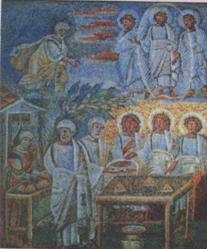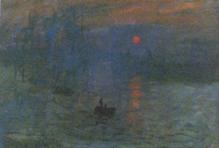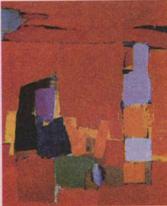-
(单词翻译:双击或拖选)
Art is influenced by the customs and faith of a people. Styles in Western art have changed many times. As there are so many different styles of Western art, it would be impossible to describe all of them in such a short text. Consequently1, this text will describe only the most important ones, starting from the sixth century AD.




The Middle Ages (5th to the 15th century AD)

During the Middle Ages, the main aim of painters was to represent religious themes. A conventional2 artist of this period was not interested in showing nature and people as they really were. A typical picture at this time was full of religious symbols, which created feeling of respect and love for God. But it was evident3 that ideas were changing in the 13th century when painters like Giotto di Bondone began to paint religious scenes in a more realistic way.
The Renaissance4 (15th to 16th century)

During the Renaissance, new ideas and values graduallv replaced those held in the Middle Ages.People began to concentrate less on religious themes and adopt a more humanistic attitude to life. At the same time painters returned to classical Roman and Greek ideas about art. They tried to paint people and nature as they really were. Rich people wanted to possess their own paintings, so they could decorate their superb5 palaces and great houses. They paid famous artists to paint pictures of themselves, their houses and possessions as well as their activities and achievements.
One of the most important discoveries during this period was how to draw things in perspective6. This technique was first used by Masaccio in 1428. When people first saw his paintings, they were convinced7 that they were looking through a hole in a wall at a real scene. If the roles of perspective had not been discovered, no one would have been able to paint such realistic pictures. By coincidence, oil paints were also developed at this time, which made the colours used in paintings look richer and deeper. Without the new paints and the new technique, we would not be able to see the many great masterpieces for which this period is famous.
Impressionism (late 19th to early 20th century)

In the late 19th century, Europe changed a great deal. from a mostly agricultural society to a mostly industrial one. Many people moved from the countryside to the new cities. There were many new inventions and social changes. Naturally, these changes also led to new painting styles. Among the painters who broke away from the traditional style of painting were the Impressionists, who lived and worked in Paris.
The Impressionists were the first painters to work outdoors. They were eager to show how light and shadow fell on objects at different times of day. However, because natural light changes so quickly, the Impressionists had to paint quickly. Their paintings were not as detailed8 as those of earlier painters. At first, many people disliked this style of painting and became very angr about it. They said that the painters were careless and their paintings were ridiculous.
Modern Art (20th century to today)

At the time they were created, the Impressionist paintings were controversial9, but today they are accepted as the beginning of what we call "modem10 art". This is because the Impressionists encouraged artists to look at their environment in new ways. There are scores of modern art styles, but without the Impressionists, many of these painting styles might not exist. On the one hand, some modem art is abstract11; that is, the painter does not attempt to paint objects as we see them with our eyes, but instead concentrates on certain qualities of the object, using colour, line and shape to represent them. On the other hand, some paintings of modern art are so realistic that they look like photographs. These styles are so different. Who can predict what painting styles there will be in the future?
点击 收听单词发音
收听单词发音
 收听单词发音
收听单词发音
1
consequently

|
|
| adv.因此,因而,所以 | |
参考例句: |
|
|
|
2
conventional

|
|
| adj.普通的,常规的;符合习俗的,因循守旧的 | |
参考例句: |
|
|
|
3
evident

|
|
| adj.明显的,显然的,明白的 | |
参考例句: |
|
|
|
4
renaissance

|
|
| n.复活,复兴,文艺复兴 | |
参考例句: |
|
|
|
5
superb

|
|
| adj.高贵的,壮丽的,极好的 | |
参考例句: |
|
|
|
6
perspective

|
|
| n.视角,观点,想法 | |
参考例句: |
|
|
|
7
convinced

|
|
| adj.确信的;深信的;有坚定信仰的v.使确信(convince的过去分词);说服 | |
参考例句: |
|
|
|
8
detailed

|
|
| adj.详细的,详尽的,极注意细节的,完全的 | |
参考例句: |
|
|
|
9
controversial

|
|
| adj.引起争论的,有争议的 | |
参考例句: |
|
|
|
10
modem

|
|
| n.调制解调器 | |
参考例句: |
|
|
|
11
abstract

|
|
| adj.抽象的;n.摘要,梗概;vt.提取;摘录要点 | |
参考例句: |
|
|
|

















